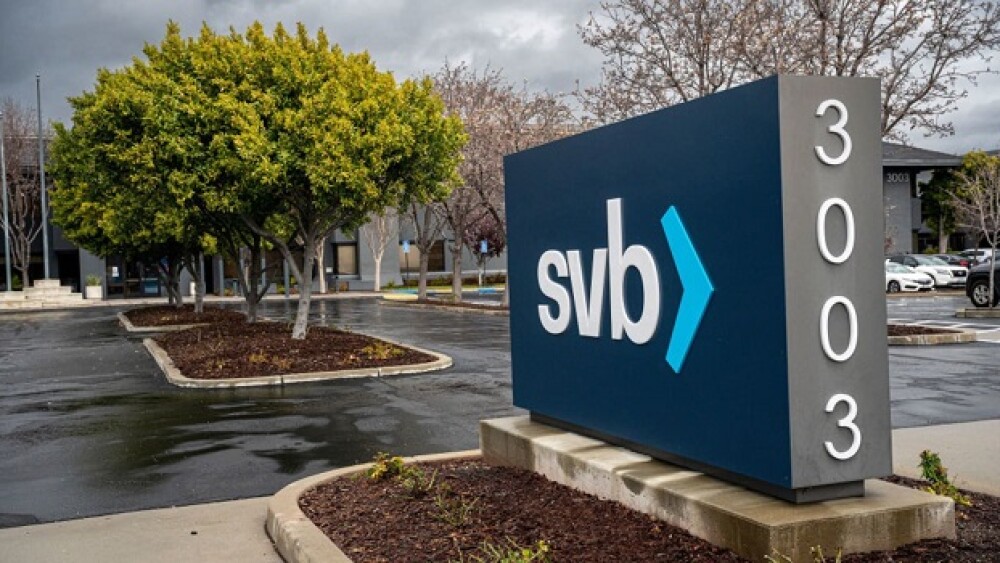The California Department of Financial Protection and Innovation shut down the Silicon Valley Bank Friday, a top financial institution for the life sciences industry, leaving biopharmas scrambling.
Pictured: SBV sign/Courtesy Bloomberg/Getty Images
Friday, the California Department of Financial Protection and Innovation (DFPI) shut down the Silicon Valley Bank (SVB), a top financial institution for the life sciences industry. In the following days, biopharma companies scrambled to secure their deposits.
In its announcement, the U.S. regulator cited “inadequate liquidity and insolvency” for SVB’s closure and named the Federal Deposit Insurance Corporation (FDIC) as the receiver.
The closure follows SVB’s announcement Wednesday that it was seeking to raise $1.75 billion in an underwritten public offering. The funds were intended to help the bank recoup approximately $1.8 billion in losses from selling its securities.
Investors saw this move as a sign that SVB could be unstable and triggered a bank run. SVB’s shares took a 60% nosedive Thursday and dropped further during pre-market trading Friday before its failure.
The bank is set to reopen Monday, according to the DFPI’s announcement.
What Will Happen to Biopharma?
SVB is a leading provider of financial services to the biopharma industry, primarily early-stage and venture-backed firms. According to its 2022 full-year financial report, the bank held $375 billion in average client funds, up 14% from the year before.
In 2022, it served nearly half of venture-backed tech and life science companies in the U.S. and supported 44% of venture-backed tech and healthcare IPOs. For these firms, the bank also provided $70 billion in average loans in 2022, a 30% increase from the year before.
The bank’s closure plunges the deposits of these companies into uncertainty. The FDIC insures deposits up to $250,000 but does not cover amounts exceeding that. Friday, the FDIC set up the Deposit Insurance National Bank of Santa Clara to serve insured depositors, who should have access to their funds Monday morning.
The FDIC has also advised SVB’s clients with sums exceeding the insurance limit to contact the regulator.
The FDIC has pledged an advance dividend for uninsured clients in the coming week and a receivership certificate for outstanding deposits.
“As the FDIC sells the assets of Silicon Valley Bank, future dividend payments may be made to uninsured depositors,” the FDIC’s announcement read.
As of year-end 2022, SVB owned around $209 billion in total assets and $175.4 billion in deposits. The FDIC has yet to determine the exact amount of deposits exceeding the insurance limit and the number of uninsured funds.
Which Companies Were Affected?
Sangamo Therapeutics reported Friday it had “approximately $34.4 million” with the bank, “substantially all of which is uninsured.” In the SEC filing, the company did not know when or to what extent it could recover its funds with SVB, but it still expects to meet payroll and other supplier obligations.
Protagonist Therapeutics also reported Friday that it had around $13 million with SVB in another SEC filing, but the company considers its exposure to the bank’s failure as “limited.” Protagonist has approximately $218 million in third-party investments held in several different institutions.
Eiger BioPharmaceuticals, Inc was also exposed to the SVB fallout, with approximately $8.3 million in bank cash deposits, corresponding to 6.9% of the company’s cash, cash equivalents and short-term securities. Eiger is actively preserving its deposits in connection with the SVB fallout.
Axsome Therapeutics and Veracyte also confirmed that they had exposure to SVB’s failure, though they expected consequences to be minimal.






